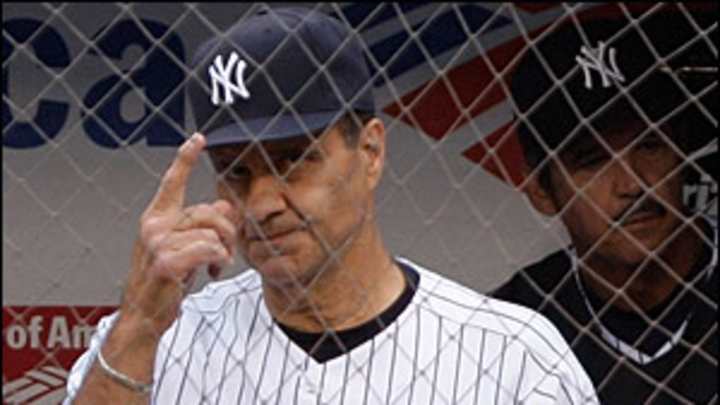My Sportsman: Joe Torre


Sports Illustrated will announce its choice for Sportsman of the Year on Dec. 3. Here's one of the nominations for that honor by an SI writer. For more essays, click here.
Go ahead and say it: A manager who fails to lead his team to the World Series despite having baseball's highest payroll deserves no accolades. In fact, you should dock his salary, pay him on a per-victory scale, and, if he should complain, banish him to the other side of the country.
Essentially, this is how Joe Torre's 12-year managerial career with the Yankees ended. Once hailed as Saint Joe for winning four titles in six years, then vilified for failing to reach the World Series for a fourth straight season, Torre departed New York unceremoniously. The Steinbrenners made him an offer he could refuse: a one-year, incentive-based contract with a pay cut. It was like offering Robert DeNiro a cameo role after a few box office flops.
The 67-year old Torre responded like a classic sportsman. He turned down the Yankees' offer, and then, instead of quietly retiring, signed a three-year contract worth $13 million to manage the Dodgers. Older generations might have called this treason since the two teams once formed baseball's biggest rivalry while meeting a record 11 times in the World Series. But it was simply Torre leaving behind unreasonable expectations for hopeful ones. There was baseball symmetry in the move too: The Brooklyn native headed West exactly 50 years after the Dodgers.
Despite his recent postseason failures, Torre succeeded in many ways this year. He was an able ringleader in baseball's biggest circus, demonstrating a superior skill in handling players, upper management and the media. He rebounded from a 21-29 start after a rash of injuries to his starting rotation. There was the drama of Alex Rodriguez burdened by his own postseason futility, the return of Roger Clemens (coming out of retirement, again), and Jason Giambi seeking respectability after his steroid confession. Thankfully, Derek Jeter's tax troubles came after the season.
Among the madness, the steady Torre guided his team of overpaid veterans, overexposed superstars and promising youngsters to a wild-card spot, finishing 26 games over the .500 mark. Still, that was perceived as failure in New York as the rival Red Sox finished two games better en route to their second World Series title in four years. Torre became the fall guy, but he controlled where he landed.
A true sportsman should not be judged by the height of his climb but rather by his response to a fall. Torre has dedicated his life to baseball -- he was a batting champion and an acclaimed broadcaster -- yet his greatest achievements have come as a manager. His resolve to keep doing what he does best deserves recognition.Agree with this selection? Give us your pick for Sportsman here.
